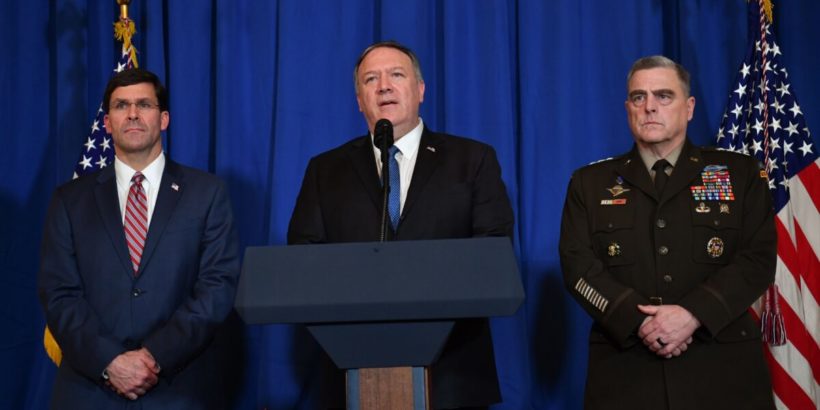Secretary of State Mike Pompeo said that any target the U.S. military may strike in Iran, in retaliation to a possible attack on America or its interests by Tehran, would be a “LAWFUL TARGET” orchestrated solely to safeguard American interests, as Iran announced it would end its commitment to the 2015 nuclear deal.
In a Jan. 5 interview with ABC’s “This Week,” Pompeo said he’s seen what the Pentagon is planning “in terms of the target set,” adding that the Department of Defense is “continuing to develop options.”
He said any U.S. military action won’t break the laws of armed conflict, adding that the current administration has changed its strategy about how it combats threats from Iran.
The American people should know that every target that we strike will be a lawful target, and it will be a target designed with a singular mission, of protecting and defending America,” Pompeo said.
The Iranian regime’s top military official, Qassem Soleimani, was killed early on Jan. 3 in a U.S. airstrike near Baghdad International Airport.
President Donald Trump ordered the strike following repeated attacks in recent months on bases hosting U.S. troops in Iraq by Iranian-backed Shiite terror groups. On Dec. 27, 2019, one such attack killed a U.S. defense contractor and injured four U.S. troops and two Iraqi Security Forces members.
The Islamic Republic of Iran has been at war with the United States and its allies since 1979, when the regime took power, and it has since carried out “massive numbers of terror attacks,” Peter Huessy, a senior defense consultant and director of strategic deterrent studies at the Mitchell Institute for Aerospace Studies, told The Epoch Times.
“The Iranian IRGC directed these attacks, and thus the administration taking out its head thug was a welcome, long overdue, and perfectly legal development—the first serious military pushback against Iran since Reagan,” Huessy said.
In April, the United States officially designated Iran’s Islamic Revolutionary Guard Corps (IRGC), which was led by Soleimani, as a foreign terrorist organization.
The Trump administration has abandoned the previous U.S. administration’s focus on countering Iranian proxy groups, said Pompeo, who suggested the U.S. strike in Baghdad that killed Soleimani is an example of the new strategy.
“We’re going to respond against the actual decision-makers, the people who are causing this threat from the Islamic Republic of Iran,” Pompeo said.
Mark Cancian, a senior adviser with the Center for Strategic and International Studies’ International Security Program, told The Epoch Times that the United States “has a lot of experience aligning its air campaigns with the laws of war.”
“Strikes on Iran would likely be limited to military targets, particularly the Quds force, of which Soleimani was the head and which has led the strikes on U.S. forces,” he said via email.
“The legality will be disputed. White House lawyers will argue that any strikes were in self-defense. The Iranians will argue that strikes violated its sovereignty and were acts of aggression.”
Trump commented a day earlier on Twitter, warning Iran that if the regime attacks Americans, Washington would target “52 Iranian sites … some at a very high level & important to Iran & the Iranian culture.”
The laws of armed conflict prohibit the deliberate targeting of cultural sites under most circumstances. Pompeo said the president “doesn’t want war” but added that he would not “shy away from protecting America.”
Iran, meanwhile, remains the “world’s worst state sponsor of terrorism,” according to the Country Reports on Terrorism 2018 report published by the U.S. Department of State on Nov. 1, 2019. The regime has funded such international terrorist groups as Hezbollah, Hamas, and the Palestinian Islamic Jihad.
“The [Iranian] regime has spent nearly $1 billion per year to support terrorist groups that serve as its proxies and expand its malign influence across the globe,” the report said.
Iran Nuclear Deal
Iran said on Jan. 5 that it would no longer abide by any of the limits of its unraveling 2015 nuclear deal with world powers. Tehran would be abandoning the accord’s key provisions that block the regime from having enough material to build an atomic weapon.
The Iranian regime had already formally breached that deal months ago, when officials announced they had begun to increase uranium enrichment above a previously agreed purity limit.
Iranian officials announced the increase on July 7, 2019, in line with earlier signals that they planned to push ahead with raising uranium enrichment to a 5 percent concentration.
In a live news conference that day, senior Iranian officials said Tehran would keep reducing its commitments every 60 days unless European signatories of the pact protected it from U.S. sanctions.
Iran insisted on a state television broadcast that it remained open to negotiations with European partners, who so far have been unable to offer Tehran a way to bypass U.S. sanctions and sell its crude oil abroad.
It also didn’t back off from earlier promises that it wouldn’t seek a nuclear weapon.
Tensions between Iran and the United States and its allies, including Saudi Arabia, have risen since Washington pulled out of the 2015 nuclear deal in 2018 and reimposed sanctions.
The Associated Press and Reuters contributed to this report
Follow Bowen on Twitter: @BowenXiao_

Citizen Journalist for C-VINE International News Network, Mother of two boys, Author, Public Relations Manager, Editor, Social Media Expert, and wife of a Professional Tennis Coach.

